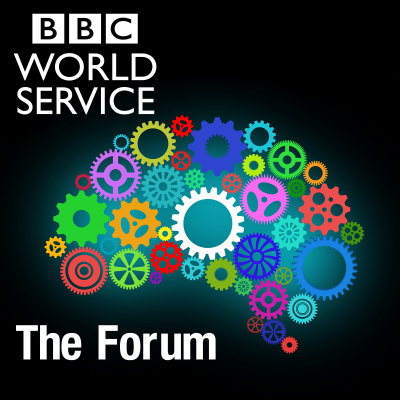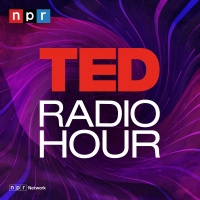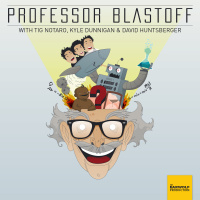Sinopse
A world of ideas
Episódios
-
How the metre changed the world
01/05/2017 Duração: 39minNowdays, if you want to find out how long one metre is, you can use a tape measure or, if you are a scientist, you can calculate the distance that light travels in a vacuum in 1/299 792 458 seconds. But how did we decide on what length a metre should be in the first place? To follow the far-from-straight story of the metre Quentin Cooper is joined by Professor Robert Crease, historian of science at Stonybrook University in the USA; Professor Marc Himbert, Scientific director of the Metrology Laboratory at CNAM in Paris; and Dr. Jahnavi Phalkey, historian of contemporary and twentieth century science and technology at King’s College in London.Photo: Lilian Bourgeat's art creation 'Tape Measure', France 2013 (Getty Images)
-
Lewis Carroll’s Alice in Wonderland
24/04/2017 Duração: 39minAlice's Adventures in Wonderland is said to be one of the most quoted books in the world. It has been translated into 174 languages, from Catalan to Zulu, and its fantastical creatures, nonsense words and magical happenings have become part of our shared cultural landscape. Bridget Kendall investigates the story behind Lewis Carroll’s Victorian literary classic and its sequel with Angelika Zirker, Assistant Professor of English Literature at Tübingen University, Germany; Virginie Iché, Associate Professor of English Studies at Paul Valéry University in Montpellier, France, and currently a Visiting Scholar at the University of Texas at Austin; and Robert Douglas-Fairhurst, Professor of English Literature at Oxford University in the UK, and author of ‘The Story of Alice: Lewis Carroll and the Secret History of Wonderland’.Illustration by John Tenniel (Photo by Rischgitz/Getty Images)
-
The Belle Epoque: A Golden Age?
17/04/2017 Duração: 40minThe Moulin Rouge in Paris is the risqué cabaret venue that encapsulates for many the 'Belle Epoque', a period of French and especially Parisian history around the turn of the 19th Century, where permissiveness mixed with political, commercial and creative optimism and when an extraordinary vitality and innovation seemed almost boundless. To explore the Belle Epoque, Dr Janina Ramirez is in Paris with the director of Le Petit Palais art gallery and museum Christophe Leribault, the associate artistic director of the Moulin Rouge, Janet Pharaoh, and professor of French history from Leeds University in the UK, Diana Holmes.(Photo: An 1891 lithograph by French artist Henri de Toulouse-Lautrec. Credit: Honda /Getty Images)
-
Machiavelli - Master of Power
10/04/2017 Duração: 39minOver five hundred years ago, dismissed diplomat Niccolò Machiavelli produced his most famous work, ‘The Prince’. Written on the fringes of the Italian city of Florence, the book has long been read as a priceless guide to power and what holding it truly involves. But who was the man behind the work? Why did he claim that a leader must be prepared to act immorally? And why did the name of this one-time political insider become a byword for cunning and sinister strategy?Rajan Datar explores the life and impact of Machiavelli’s ‘The Prince’, with writer and scholar Erica Benner, historian Professor Quentin Skinner and journalist David Ignatius.Image:Circa 1499, Niccolò Machiavelli (Hulton Archive/Getty Images)
-
Haile Selassie: The last Emperor of Ethiopia
03/04/2017 Duração: 39minEmperor Haile Selassie was the last in the line of Ethiopia’s ancient monarchy. During his long rule he was revered as an international statesman and reformer, demonised as a dictator, and even worshipped as a God incarnate by the Rastafarians of Jamaica. He was without doubt a controversial figure, but achieved a status in the global arena previously unheard of for an African ruler.Bridget Kendall discusses Haile Selassie’s life and legacy with Prince Asfa-Wossen Asserate, political analyst and author of ‘King of Kings: The Triumph and Tragedy of Emperor Haile Selassie I of Ethiopia’, who is also the great-nephew of Haile Selassie; Gerard Prunier, Independent Consultant on Eastern and Central African affairs, and former Director of the French Centre for Ethiopian Studies in Addis-Ababa; and Laura Hammond, an anthropologist specialising in Ethiopia at the School of Oriental and African Studies, University of London.Image: Haile Selassie Credit: Henry Guttmann/Getty Images
-
The KGB: Secrets and Spies
27/03/2017 Duração: 39min2017 is the centenary of the Cheka – the Bolshevik secret police organisation from which the KGB eventually emerged in 1954. The KGB was not just an intelligence agency like its adversaries in the west, but an all-encompassing organisation that covered every aspect of promoting and protecting the Soviet one party state. From its headquarters in Moscow’s infamous Lubyanka, the KGB’s influence spread across the world. To explore the KGB and its legacy, Bridget Kendall is joined by the Cambridge historian, Professor Christopher Andrew, the Anglo American intelligence and policy expert, Dr Calder Walton and the Russian historian, Dr Svetlana Chervonnaya.Photo: Badge logo of the KGB (Photo credit: KGB)
-
The Magic of Bronze
20/03/2017 Duração: 39minFrom Cellini's magnificent Perseus statue to the humblest of tools, people have been using bronze for at least five thousand years. So what makes bronze such a versatile material, how we first discovered it, and why is it that so many precious bronze art works have failed to survive? Bridget Kendall is joined by Carol Mattusch, Professor Emerita of Art History at George Mason University, Professor Jianjun Mei, from the University of Science and Technology, Beijing and Director of the Needham Institute in Cambridge who specialises in ancient metallurgy, and David Ekserdjian, Professor of Art and Film History at Leicester University. Also in the programme: Dutch sound artist Floris van Manen follows the key stages of making a bronze bell at Eijsbouts, one of Europe's leading foundries.Photo: Cellini's statue of Perseus holding the head of Medusa (Getty Images)
-
Marie Curie: A pioneering life
13/03/2017 Duração: 39minThe Polish physicist and chemist Marie Curie was the first woman to receive a Nobel Prize, and the first person to be awarded twice in two different fields. Her discoveries in the field of radioactivity – adding polonium and radium to the table of elements – changed the course of scientific history and led to huge advances in the treatment of cancer.Quentin Cooper traces Marie Curie’s extraordinary life story with Patricia Fara, president of the British Society for the History of Science; Maciej Dunajski, mathematician and theoretical physicist at Cambridge University; and Susan Quinn, author of Marie Curie: A Life.(Photo: Marie Curie. Credit: Hulton Archive/ Getty Images)
-
Beethoven: The genius rule breaker
06/03/2017 Duração: 54minBeethoven revolutionised music - how we listen to it and how we play it.Bridget Kendall explores Beethoven’s universal appeal and the anguished genius himself with Emeritus Professor of music and Beethoven expert Professor John Deathridge, musician and lecturer Dr Natasha Loges, Artistic Director of the Musical Society of Nigeria, (MUSON) and the NOK Ensemble, Nigeria's first professional chamber orchestra, Tunde Jegede and writer and composer Neil Brand.Image: Beethoven Credit: Rischgitz/Stringer/Getty Images
-
Yellow fever: Man against mosquito
27/02/2017 Duração: 39minOutbreaks of yellow fever, such as the notorious 1878 'American plague' which swept through Memphis, Tennessee, used to kill thousands in a matter of weeks. So why was it so devastating? How did we manage to tame it in some parts of the world? And why does yellow fever still present a danger today for nearly a billion people living in tropical parts of Latin America and Africa?Bridget Kendall discusses the history and the future of yellow fever with American writer and journalist Molly Crosby, author of The American Plague; history professor from the University of Virginia, Christian McMillen who has a special interest in past and present epidemics; and Dr. Nick Beeching who teaches clinical infectious diseases at the Liverpool School of Tropical Medicine.Photo: Yellow Fever Virus (Credit: Centers for Disease Control and Prevention Public Health Image Library)
-
The real story of Frankenstein
20/02/2017 Duração: 39minIn the nearly 200 years since Mary Shelley wrote Frankenstein, the story has taken on a life of its own. But the original tale is much more psychologically complex than the horror film versions suggest – a disturbing and thought-provoking parable that roots itself in the basic human need for love.Bridget Kendall discusses the book’s origins, themes and continuing legacy with two scholars of English literature - Prof Karen O’Brien from Oxford University in the UK and Jessica Tiffin from the University of Cape Town in South Africa, and with the novelist and radio dramatist Jonathan Barnes.(Photo: A statue of the Frankenstein Monster. Credit: Getty Images)
-
The birth of hip hop
13/02/2017 Duração: 39minThe story of early hip hop, from 1970s 'block parties' in the South Bronx to the next decade when some musicians used rap for harsh social critique while others looked to it for big commercial success. Trevor Nelson talks to Duke University hip hop historian Mark Anthony Neal, film-maker and impresario Michael Holman, and one of the central figures in early hip hop, Grandmaster Caz.DJ and MC Grandmaster Caz is one of the most important and influential pioneers of old school rap. Mark Anthony Neal is professor of African and African American Studies and the founding director of the Center for Arts, Digital Culture and Entrepreneurship at Duke University. Michael Holman is a leading New York hip-hop activist: musician, filmmaker, artist manager, club promoter, journalist and critic, television producer, archivist, visual artist, and educator.(Photo: A breakdancer. Credit: Getty Images)
-
Seven Samurai: A Japanese masterpiece
04/02/2017 Duração: 39minThe 1954 Japanese epic Seven Samurai by Akira Kurosawa has been described as one of the most influential films in the history of cinema. Set in 16th century rural Japan it tells the story of a small village that hires seven masterless samurai to protect them from a group of bandits intent on stealing their harvest. Seven Samurai’s unique style and themes redefined the action movie genre and inspired filmmakers across the world. Bridget Kendall talks to Daisuke Miyao, Professor of Japanese film at the University of California, San Diego; David Desser, Emeritus Professor of Cinema Studies at the University of Illinois; and Dolores Martinez, Emeritus Reader in Anthropology specializing in Japanese popular culture at the School of Oriental and African Studies in London.Photo: Actor Toshiro Mifune in the film Seven Samurai (Credit: AFP/ Getty Images)
-
Goethe: The story of colour
30/01/2017 Duração: 43minThe German polymath Johann Wolfgang von Goethe considered his monumental book known in English as The Theory of Colours to be his greatest achievement. The book is a record of hundreds of Goethe's observations about the way colour affects our mood, as well as a long and heated polemic with Isaac Newton's colour theory. Goethe's understanding of light and colour was scientifically flawed yet his book had a surprisingly strong influence on the fine and applied arts. To find out why, Bridget Kendall talks to art historian Alexandra Loske, colour writer Victoria Finlay and designer Odette Steele.Alexandra Loske is an art historian who teaches at the University of Sussex, Curator at the Royal Pavilion and Brighton Museums, editor of the book Languages of Colour and author of Palette (forthcoming);Victoria Finlay is a writer, former arts editor of the South China Morning Post and the author of Colour, Travels through the Paintbox and The Brilliant History of Color in Art;Odette Steele is a Zambian textile designer
-
Mata Hari: Dancer, lover, spy
23/01/2017 Duração: 39minIt is 100 years since the exotic dancer and legendary ‘femme fatale’ Mata Hari was executed by a French firing squad for passing secrets to the Germans during World War One. She was described at the time as the ‘greatest woman spy of the century’. But many now see Mata Hari as a convenient scapegoat, condemned merely for her unconventional lifestyle. Bridget Kendall discusses the myths and realities surrounding women in espionage with Julie Wheelwright, programme director of non-fiction writing at City, University of London, and author of The Fatal Lover: Mata Hari and the Myth of Women in Espionage; Tammy Proctor, Professor of History at Utah State University and author of Female Intelligence: Women and Espionage in the First World War; and Hanneke Boonstra, a Dutch journalist who is writing an official blog about Mata Hari as part of this year’s centenary commemorations in the Netherlands.(Photo: Mata Hari. Credit: Getty Images)
-
The Silicon Chip: A Tech Revolution
16/01/2017 Duração: 39minIt’s forty five years since the commercial introduction of the first microcomputer chip set which evolved into the modern microprocessor, changing computers from tools for scientists into the engines which power today’s electronic consumer appliances. So how did the silicon chip evolve and where might this revolution be heading next? Bridget Kendal is joined by four distinguished computer and internet pioneers who helped spearhead some of the most important inventions of the computer age. Vinod Dham invented the first Pentium micro-processor and went on to become Vice-President at the world’s largest chip maker-Intel. His early work in this field earned him the nickname “The Father of the Pentium chip.” Sophie Wilson’s computer design was used to build the Acorn Micro-Computer. She also led the development of the ARM microprocessor, found in over half of the world’s consumer electronics. David Laws is a technology historian and a curator of the Computer History Museum in California. Dame Wendy Hall is a Pro
-
The Powers of the American President
09/01/2017 Duração: 39minWhat powers does the American President have, and how have these changed over the years to reflect the demands of the modern world?
-
Fela Kuti: King of Afrobeat
02/01/2017 Duração: 39minNigerian Afrobeat musician Fela Kuti was a maverick performer, a musical pioneer, and is a continuing inspiration across the world. But he was also a thorn in the side of the Nigeria’s successive military governments and a fearless activist for social justice. Twenty years after his death, Peter Okwoche is joined by three people who all had personal experience of Fela Kuti, to discuss his complex and extraordinary life, musical legacy, and revolutionary political ideals - Dele Sosimi is a former member of Fela Kuti's band and now an acclaimed Afrobeat musician; Carlos Moore wrote the only authorised biography of Fela Kuti, Fela: This Bitch of a Life; and Jahman Anikulapo is a Nigerian arts journalist who followed Fela's career closely.Photo: Fela Kuti, 1986, Credit: Associated Press
-
Cali-topia: a New Vision of Thomas More's Utopia?
26/12/2016 Duração: 39minIs Thomas More's vision of an ideal society becoming reality in modern-day California? The Forum travels to Singularity University at the heart of Silicon Valley to ask why California keeps attracting utopian thinkers who want to use advanced technology to solve humanity’s biggest challenges.Jack Stewart is joined by forecaster Paul Saffo, Chair of Future Studies at Singularity University, Ryan Mullenix, partner at NBBJ Architecture, Krista Donaldson, CEO of Silicon Valley healthcare start up D-Rev, and Colin Milburn, Chair in Science and the Humanities at University of California, Davis.Photo: NASA Hangar One at Moffett Field, California, Credit: Simon Dawson
-
Utopia: Mr More’s Wondrous Islands
21/12/2016 Duração: 29minThomas More’s Utopia, published 500 years ago this month, is full of radical ideas and has provided food for thought to generations of people trying to find new ways to organise society. On his fictitious island More created a vivid mosaic of places, people and their customs and they have proven to be an inspiration not just for philosophers and politicians but also for writers. To mark the anniversary, BBC World Service and PEN International have asked three young authors, Rebecca F. John, Jose Pablo Salas and Lea Sauer, to take Utopia as a starting point for a new short story. Mr. More’s Wondrous Islands also includes a couple of intriguing passages from the original book. It is introduced by Jack Stewart, the readers are John Dougall, Bettrys Jones, Martina Laird and William Marquez and the producer is Radek Bosketty.










